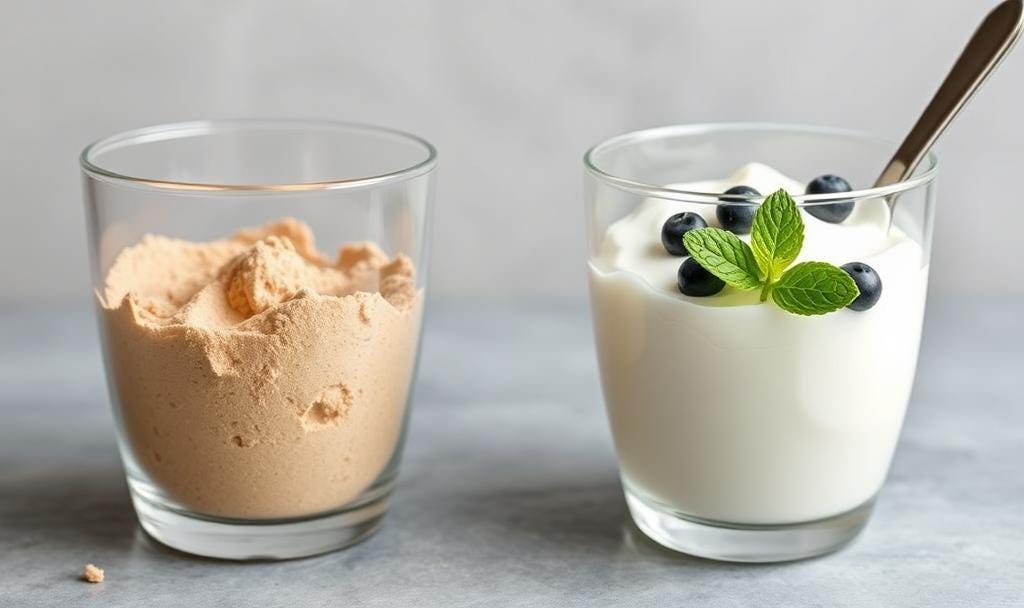You Probably Don't Need More Protein
How much protein do we need? Is too much protein a problem? What are good sources of protein?
UPDATED: July 15th, 2025
Welcome to the Healthy Aging Newsletter, a free publication that turns trustworthy medical research into simple habits so adults in their 30s and 40s can stay healthy and avoid common chronic conditions. I’m Dr. Ashori, a family medicine doctor.
The modern individualistic culture is fueled by commercial interest in selling protein so that you can “perform” better in life: be more, achieve more, stand out. But do you really need 150 grams of protein per day? Do we, as humans, even think in terms of grams when it comes to food?
20 years of practicing medicine and now managing my own patients in my private practice, I don’t know anyone who counts their macronutrients except for one bodybuilder patient. I think there is a better way to think about the protein content of our food.
How I Think About My Food
Except for when I’m being social-media-blasted that my abs aren’t flat enough or that my VO2 Max isn’t high enough, I’m rather content with my overall health, which is closely tied to my nutrition.
In my clinical practice with patients I try to talk less about food and more about nutrition because the topic of food is a sensitive one. But when it comes to actual eating, well, I don’t know anyone who looks at a plate and sees Manganese, Selenium, Amino Acids, and Short-Chain Fatty Acids. We see quinoa, fries, blueberries, and mashed potatoes.
I don’t know anyone who counts their macronutrients except for one bodybuilder patient.
With these ingredients, our bodies have an inherent ability to heal, repair, and regenerate just like most other creatures on this planet. Food is necessary for this process and ties us to our environment in the cycle of life. Reducing food down to macronutrients misses the nuance of food and all its many characteristics.
How Much Protein Do You Need?
The answer is simple, and I think most health experts would agree: you only need enough protein to stay healthy. But what if you’re dealing with a medical condition like diabetes or heart disease or obesity? The answer doesn’t change, as I’ll explain below.
In rare circumstances, when patients have major kidney disease or severe diabetes, sometimes we need to be more careful with macros (macro-nutrients), such as lowering protein intake in case of renal disease and higher glycemic-load foods in severe diabetes. But for the rest of us, our diet don’t need to vary too much.
You only need enough protein to stay healthy.
Health gurus online claim that protein intake should be increased so that you don’t eat as much carbs like flour tortillas, white rice, candy, or soda. But you don’t need to increase your protein to achieve that. Just as you wouldn’t just work more overtime to fix your overspending on Amazon.
We need enough protein to maintain a healthy body composition where we don’t have too much visceral fat, a healthy amount of subcutaneous fat, and enough muscle to maintain our bone health, balance, strength, and endurance.
Naturally, some days you’ll crave more fruits than chicken, more soup instead of bread, and more burgers than curries. Some call this intuitive eating and when in doubt, you can always do a little calorie counting to troubleshoot your diet.
Protein Isn’t a Free Lunch
Eating too much fat raises your cholesterol, upsets your intestinal motility, or creates inflammation. Too much carbohydrates and your blood sugar goes up, you crash after meals, and you experience skin problems. The same goes for proteins - there is such a thing as too much protein.
Dr. Luigi Fontana, in his book The Path to Longevity, discusses the various health problems that can arise from excess protein intake, backed by good clinical research. From elevated IGF1 to insulin resistance to intestinal problems, excess protein has been associated with its own share of complications.
Every diet in the history of mankind that has vilified or exalted one macronutrient for another has been proven wrong so far. Protein is no different. The “sugar spike” you are avoiding by having an egg instead of oats is offset by the fiber you’re not getting. Not that eggs are bad or oats are good, you understand.
How to Measure Your Health
Some of my patients ask, how do I know if my body is healthy? Sometimes the answer is clear because they carry too much weight in the midsection or they feel incredible exhaustion after just a few stairs or moving furniture in the house. Others, work out regularly, eat a balanced diet, and have healthy blood pressures and lipid profiles. Their energy levels and sleep is where they want it to be, so they don’t question their diet.
We need just enough protein to maintain a healthy body composition without too much visceral fat, a healthy dose of subcutaneous fat, and enough muscle for bone health, balance, strength, and endurance.
A whole book would have to be dedicated to answering the question “How to Measure Your Health” but in my practice at DrAshori.com we always start with how do you feel? And if someone is unsure if they are healthy, we offer to measure the biomarkers most commonly associated with good health: blood pressure, serum lipids, inflammatory markers, and a DEXA scan, sleep quality, etc. Biomarkers are always secondary to how you actually feel and experience your daily life.
If you discover that you are “healthy” it’s often safe to continue with your current nutrition plan. If you have any risk factors for disease or are seeing the first signs of unhealthy aging, we do a dive into what you’re eating and see how it’s affecting you.
Is Meat Bad For You?
What about eggs? I always get these questions so it’s worth addressing here. It’s not that meat or eggs or dairy are bad for you but there is a ceiling or threshold of how much of it we can have before we develop complications from too much of them.
If you believe that there is always “too much of a good thing” or “the dose makes the poison” then you’ll agree with me that there is a protein intake limit as well. Even Dr. Mike Isratel has a protein intake limit, though his is around 230 grams per day and he openly admits that his overall health is secondary to his athletic goals.
What about ultraprocessed foods? After all, everyone claims that even the tiniest amount of UPF is bad for you. Actually, James McCormack did a nice deep dive in his Nutrition Cold War series and showed that up to even 30% of total calories from UPF, you might still be safe.
How dangerous is it if you’re eating mostly protein? It depends on your personal baseline risk. After all, the risk to you individually from any particular intervention is based on your baseline risk. Another way to say it, if you are at very high risk of cancer then raising your IGF1 with too much protein intake might pose a bigger risk than someone with no personal or family history risk of cancer.
Does the Source of Proteins Matter
Is whey powder okay? What about lean beef? Eggs? Pasture raised chicken? The most important answer I can give is that just because the source is more pure doesn’t mean you can have endless amount of … anything, including protein. That said, if the dose makes the poison, the quality makes it lethal.
Ultraprocessed powders like whey protein could be safe but conventional wisdom would say it’s not the best choice. And eating beef from an animal that was raised humanely without a ton of hormones and antibiotics might be a better source than traditional big-farm animals.
As for eggs, they have protein and they have cholesterol, so, take that into consideration. Just as bacon has both saturated fat and protein. Ask yourself if you believe whether saturated fat can lead to ASCVD (heart disease) - many say no, it doesn’t. This author believes that for most of us, excess saturated fat intake can increase plaque buildup in the arteries. If the data shifts in the future, I might change my opinion and I’ll share that with you here.
Are plant proteins enough? Is it okay if I don’t consume any meats? From personal experience with my patients, if you don’t eat animal proteins you can still be quite healthy. There isn’t convincing data to show that you’ll have major health problems because you didn’t eat beef, pork, chicken, or even fish.
So How Much Protein Should You Eat?
If you’ve read up to now, you know the answer: enough to keep you healthy and enough to keep your food palatable. That’s the best answer I can give you. But if you want more details, please read on.
To be deficient in protein intake you have to consistently consume less than 0.5-0.6 grams per kilogram (g/kg) per day. Protein is everywhere: eggs, oats, lentils, bread, avocado, even broccoli. For a 150 lb person you’d have to mostly consume very small amounts of fruits and green vegetables to fall under this amount.
If you’re able to move objects, do some aerobic activities like walk, sleep well, have experience good emotional health, you don’t carry extra weight in the midsection, and your common biomarkers are within range, you should eat the amount of protein that keeps you feeling along this same trajectory. Crave a little more protein? Choose some good quality proteins and enjoy it.
If you’re dealing with excess visceral fat (weight around the midsection), have poor energy, poor recovery, mood problems, or intestinal issues, try experimenting with your diet using a food journal and see if something changes.





Just read this, and I couldn't agree more. For an average person, they really don't need all that much, unless of course you're constantly working out or are an athlete. There's this over dramatisation in the world right now with protein and its getting scary, with shelves being lined up with protein laden snacks, which could actually be causing more harm than good.
Thank you again for this important reminder.
Good article. Please also point out that the protein recommendation is based on your lean body mass not your weight.
If you weigh 600lbs you do not need 163 grams of protein a day ! ( if my math is correct that would be 0.6 grams per kilo )
Otherwise an excellent piece.